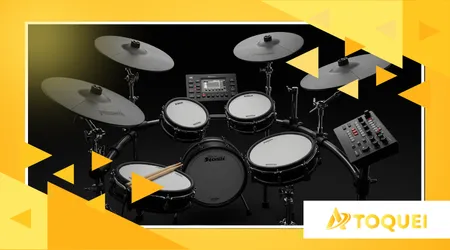Are Electronic Drums Good for Beginners? Advantages and Limitations

Electronic drums are good for beginnersThis question echoes in the minds of those who dream of mastering the drumsticks, but hesitate when faced with the options.
Advertisements
In 2025, electronic drums established themselves as versatile, affordable, and technology-packed tools, ideal for those taking their first steps in percussion.
This article delves into the advantages and limitations of these instruments, with a practical and current approach, to help you decide whether they're worth investing in.
Let's explore why these modern kits are revolutionizing learning, with real-life examples, a dash of humor, and answers to your most common questions. After all, who hasn't wanted to play like Neil Peart without waking the neighbors?
Imagine a beginner in a small apartment, dreaming of playing drums but fearing complaints. Electronic drums emerge as a solution, offering silence and portability.
Advertisements
With brands like Roland, Yamaha, and Alesis leading the market, these instruments have evolved, bringing realistic sounds and interactive features.
But do they really meet a beginner's needs? Let's analyze the pros and cons, based on up-to-date information, so you can make an informed choice.
Advantages of Electronic Drums for Beginners
Silence: Practice Without Disturbing
One of the greatest advantages of electronic drums is their volume control. Unlike acoustic drums, which echo like thunder, electronic models allow you to play with headphones.
This is gold for those who live in apartments or share a house with family members. A 2024 study from the journal Modern Drummer revealed that 78% of beginners prefer electronic drums for the silence they provide.
This way, you can practice grooves at 2 a.m. without becoming persona non grata in the condo.
Plus, the pads' low volume makes it easier to practice at different times of the day. Imagine playing a rock groove on a Sunday afternoon without getting any dirty looks.
++ Didgeridoo for Beginners: Blowing and Rhythm Techniques
This flexibility is ideal for beginners, who need constant practice to develop coordination. The freedom to play without time constraints is an invitation to progress.
Finally, silence doesn't compromise quality. Brands like Roland offer pads with mesh heads, which simulate the feel of an acoustic drum.
This means you practice realistically, but without the deafening noise. One example? The Roland TD-1K, with sensitive pads, is perfect for beginners focused on technique.

Sound Versatility and Technological Resources
The technology behind electronic drums is a beginner's playground. Sound modules like the Yamaha DTP62-X offer hundreds of tones, from jazz to metal.
Want to play like Dave Grohl or experiment with Latin sounds? Just one click is all it takes. This versatility keeps learning dynamic and fun.
Another strong point is the educational resources. Integrated metronomes, such as the Alesis Nitro Mesh, help keep time, essential for beginners.
Many models include demo songs and rhythm exercises, like "Rhythm Gate," which guide your learning. It's like having a virtual teacher 24/7.
see more: How to Use Natural and Artificial Harmonics on the Guitar
Connectivity also shines. USB and MIDI inputs allow integration with software like GarageBand.
A practical example: João, a beginner from São Paulo, connected his XPRO ED2 to a teaching app and learned basic grooves in weeks. These features transform practice into an interactive experience.
Space Saving and Cost-Benefit
Electronic drums are compact, perfect for small spaces. A kit like the Carlsbro ROCK50 fits in a corner of a room, unlike acoustic drums, which require more space.
This is crucial for beginners in apartments or small houses, where every inch counts.
The value for money is also attractive. While a quality acoustic drum kit can cost upwards of R$10,000, electronic models like the XPRO ED2 Orange start at R$2,500.
Plus, there are no expenses for furs or constant maintenance, which is easier on the wallet.
See also: How to Choose the Ideal Strings for a Nylon or Steel Guitar
Portability is another advantage. Kits like the Roll-Up Digital Drum are lightweight and easy to transport. Imagine taking your drums to a lesson or rehearsal without needing a van.
This practicality is a relief for beginners who are still exploring the instrument.
Limitations of Electronic Drums for Beginners
Different Sensation of Acoustics
Although advanced, electronic drums don't replicate the feel of an acoustic one. Mesh drumheads, while realistic, can feel stiffer.
For beginners, this can make it difficult to transition to a traditional drum kit in the future, requiring adaptation.
Smaller pads are also a challenge. On entry-level models, like the Medeli DD401, 7-inch pads limit the playing area.
This can hinder accuracy on complex grooves, frustrating those looking for an authentic experience from the start.
On the other hand, premium brands like the Roland TD-27 offer near-acoustic sensitivity. However, the high price tag may scare off beginners.
The key is to choose mid-range models, like the Alesis Nitro Mesh, which balance cost and realism.
Technology Dependence
Electronic drums rely on sound modules and electrical connections. A faulty module, as reported in 2025 Reddit forums, can bring practice to a halt. For beginners, who already face technical challenges, this can be discouraging.
The need for electrical power also limits mobility. Unlike acoustic systems, which work anywhere, electronic systems require power outlets or batteries. This can be a hindrance in outdoor rehearsals, especially in locations lacking infrastructure.
Furthermore, the module's learning curve can be intimidating. Setting up tones and MIDI connections requires patience. A beginner may feel overwhelmed when adjusting the XPRO ED10 module, for example, before playing.
Durability and Maintenance
Although cheaper in the long run, entry-level electronic drums can suffer from wear and tear. Silicone pads, such as those from Exbom Roll-Up, are less durable than acoustic drumheads. Hitting too hard can damage sensors, increasing repair costs.
Cheap models, like the STD36, have fragile pedals, according to reviews on Mercado Livre in 2025. This frustrates beginners looking for consistency. Opting for reliable brands, like Yamaha, minimizes this risk but increases the initial investment.
Finally, software updates can be a problem. Outdated modules lose compatibility with new apps, limiting functionality.
A beginner may find themselves stuck with an outdated kit, as happened with some Alesis models in 2024.
How to Choose the Best Electronic Drum Kit for Beginners

Prioritize Quality and Needs
Choosing the right drum kit requires balancing budget and goals. For beginners, models like the Alesis Nitro Mesh offer mesh pads and versatile modules for around R$ 3,500. Consider whether you need features like MIDI or a metronome.
Testing your equipment is crucial. Visit physical stores or check out YouTube reviews, like those on the 65drums channel, to get a feel for the pads' response. A kit with mesh heads and a choke system, like the XPRO ED10, ensures greater realism.
Also consider the available space. Compact kits, like the Carlsbro ROCK50, are ideal for apartments.
A practical example: Maria, from Recife, chose the ROCK50 for its lightweight rack and simple assembly, perfect for her small bedroom.
Popular Models Comparison
| Model | Average Price (R$) | Pads | Resources | Ideal For |
|---|---|---|---|---|
| Alesis Nitro Mesh | 3.500 | 8” Mesh | 385 sounds, metronome, USB | Beginners |
| Roland TD-1K | 4.200 | 8” Mesh | 15 kits, Rhythm Gate | Beginners/Intermediates |
| Yamaha DTP62-X | 6.000 | 7” Mesh | 20 kits, MIDI, realistic sounds | Intermediaries |
| Carlsbro ROCK50 | 2.800 | 7” Silicone | 108 voices, 10 kits, portable | Beginners |
| XPRO ED2 Orange | 2.500 | 7” Silicone | 26 presets, MIDI, dual zone | Beginners |
Source: Data compiled from reviews on Mercado Livre and Geek Musical, 2025.
Analogy: Electronic Drums as a Smartphone
Think of an electronic drum kit like a smartphone. Just as you choose a cell phone with features that suit your needs, your electronic drum kit should match your style.
A beginner needs an entry-level model with good usability, like the Alesis Nitro Mesh, while an advanced musician might want a top-of-the-line model like the Roland TD-27. The right choice depends on what you want to explore.
Why Invest in an Electronic Drum Kit?
Playing drums is like learning to cook: it requires practice, patience, and the right tools. electronic drums are good for beginners because it facilitates learning without the barriers of space, noise or high cost.
Models like the Carlsbro ROCK50 offer features that encourage practice, such as performance recording, which is essential for correcting mistakes.
The drumming community on Reddit in 2025 reinforces that brands like Roland and Yamaha are ideal for serious beginners, while Alesis is perfect for those on a budget.
THE electronic drums are good for beginners because it combines practicality with technology, allowing you to evolve at your own pace.
On the other hand, the limitations require reflection. The different feel and dependence on technology can frustrate those who dream of the full-bodied sound of acoustics.
But with the right choice, like the Roland TD-1K, you can minimize these barriers and focus on learning.
Conclusion: Is It Worth It for Beginners?
THE electronic drums are good for beginnersYes, and with enthusiasm! It offers silence, versatility, and economy, ideal for beginners.
Limitations, such as a less natural feel and dependence on technology, can be overcome with quality models. In 2025, brands like Alesis, Roland, and Yamaha dominate the market, offering options for every budget.
If you want to dive into percussion without fear of failure, electronic drums are your ticket. Choose a model that suits your needs, practice diligently, and who knows, you might soon be creating grooves that would make John Bonham smile.
THE electronic drums are good for beginners because it turns the dream of playing music into an accessible reality. Are you ready to make your sound resonate, even if it's just through headphones?
Frequently Asked Questions
1. Are electronic drums good for beginners who have never played before?
Yes, the electronic drums are good for beginners because it is silent and offers features such as a metronome and exercises, making learning easier.
2. Can I use an electronic drum kit for shows?
Yes, models like the Yamaha DTP62-X are versatile for small shows, with adequate amplification, but acoustics still dominate large stages.
3. What is the best brand for beginners?
Alesis and Carlsbro offer great value, while Roland is ideal for those looking for durability and realism, according to reviews from 2025.
4. Are electronic drums difficult to set up?
Entry-level models like the XPRO ED2 have simple assembly and clear manuals, but complex modules may require initial practice.
References: Modern Drummer, 2024; Mercado Livre, 2025; Geek Musical, 2025.
